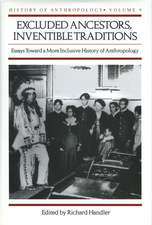Vehicles
Editat de Richard Handler, David Lipseten Limba Engleză Hardback – 31 iul 2014
"...An excellent and original volume, a fine example of what comparative anthropology can achieve. Furthermore, in addition to its main topic and objectives (about particular metaphors, what they 'do' and how they 'work'), it addresses key issues in the study of objects, material culture, and techniques, namely the involvement of materiality in non-verbal communication." · Pierre Lemonnier, Université d'Aix-Marseille
Metaphor, as an act of human fancy, combines ideas in improbable ways to sharpen meanings of life and experience. Theoretically, this arises from an association between a sign-for example, a cattle car-and its referent, the Holocaust. These "sign-vehicles" serve as modes of semiotic transportation through conceptual space. Likewise, on-the-ground vehicles can be rich metaphors for the moral imagination. Following on this insight, Vehicles presents a collection of ethnographic essays on the metaphoric significance of vehicles in different cultures. Analyses include canoes in Papua New Guinea, pedestrians and airplanes in North America, lowriders among Mexican-Americans, and cars in contemporary China, Japan, and Eastern Europe, as well as among African-Americans in the South. Vehicles not only "carry people around," but also "carry" how they are understood in relation to the dynamics of culture, politics and history.
David Lipset is Professor of Anthropology at the University of Minnesota and has conducted fieldwork among the Murik Lakes people in Papua New Guinea since 1981. He is the author of two books, Gregory Bateson: Legacy of a Scientist (1982) and Mangrove Man: Dialogics of Culture in the Sepik Estuary (1997) as well as articles on culture, masculinity and modernity in Melanesia. His most recent book (co-edited with Paul Roscoe) is Echoes of the Tambaran: Masculinity, History and the Subject in the Work of Donald F. Tuzin (2011).
Richard Handler is Professor of Anthropology at the University of Virginia, where he is Director of the Program in Global Development Studies. He has written extensively on nationalism and the politics of culture, museums, and the history of anthropology. His most recent book is Critics Against Culture: Anthropological Observers of Mass Society (2005).
| Toate formatele și edițiile | Preț | Express |
|---|---|---|
| Paperback (1) | 259.21 lei 43-57 zile | |
| BERGHAHN BOOKS – 11 oct 2017 | 259.21 lei 43-57 zile | |
| Hardback (1) | 748.14 lei 43-57 zile | |
| BERGHAHN BOOKS INC – 31 iul 2014 | 748.14 lei 43-57 zile |
Preț: 748.14 lei
Preț vechi: 971.61 lei
-23% Nou
Puncte Express: 1122
Preț estimativ în valută:
143.20€ • 155.60$ • 120.37£
143.20€ • 155.60$ • 120.37£
Carte tipărită la comandă
Livrare economică 21 aprilie-05 mai
Preluare comenzi: 021 569.72.76
Specificații
ISBN-13: 9781782383758
ISBN-10: 1782383751
Pagini: 224
Dimensiuni: 152 x 229 x 14 mm
Greutate: 0.47 kg
Editura: BERGHAHN BOOKS INC
ISBN-10: 1782383751
Pagini: 224
Dimensiuni: 152 x 229 x 14 mm
Greutate: 0.47 kg
Editura: BERGHAHN BOOKS INC
Notă biografică
David Lipset is Professor of Anthropology at the University of Minnesota and has conducted fieldwork among the Murik Lakes people in Papua New Guinea since 1981. He is the author of two books, Gregory Bateson: Legacy of a Scientist (1982) and Mangrove Man: Dialogics of Culture in the Sepik Estuary (1997) as well as articles on culture, masculinity and modernity in Melanesia. His most recent book (co-edited with Paul Roscoe) is Echoes of the Tambaran: Masculinity, History and the Subject in the Work of Donald F. Tuzin (2011). Richard Handler is Professor of Anthropology at the University of Virginia, where he is Director of the Program in Global Development Studies. He has written extensively on nationalism and the politics of culture, museums, and the history of anthropology. His most recent book is Critics Against Culture: Anthropological Observers of Mass Society (2005).

























